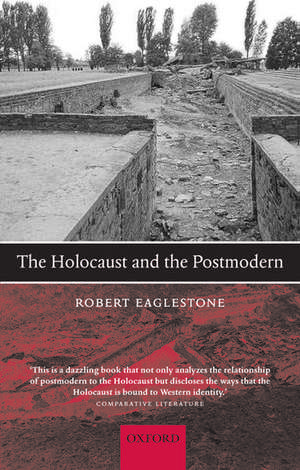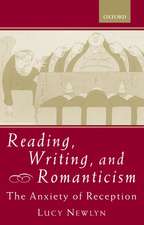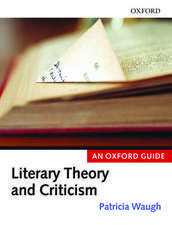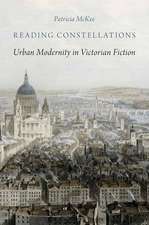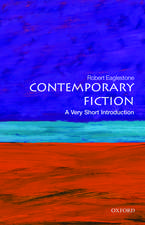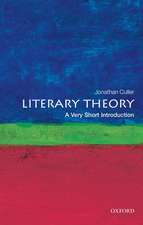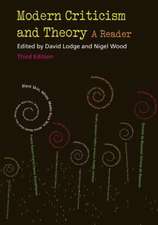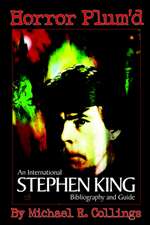The Holocaust and the Postmodern
Autor Robert Eaglestoneen Limba Engleză Paperback – 28 feb 2008
| Toate formatele și edițiile | Preț | Express |
|---|---|---|
| Paperback (1) | 314.01 lei 31-37 zile | |
| OUP OXFORD – 28 feb 2008 | 314.01 lei 31-37 zile | |
| Hardback (1) | 1184.02 lei 31-37 zile | |
| OUP OXFORD – 9 dec 2004 | 1184.02 lei 31-37 zile |
Preț: 314.01 lei
Preț vechi: 383.16 lei
-18% Nou
Puncte Express: 471
Preț estimativ în valută:
60.09€ • 62.51$ • 49.61£
60.09€ • 62.51$ • 49.61£
Carte tipărită la comandă
Livrare economică 02-08 aprilie
Preluare comenzi: 021 569.72.76
Specificații
ISBN-13: 9780199239375
ISBN-10: 0199239371
Pagini: 368
Dimensiuni: 138 x 211 x 22 mm
Greutate: 0.47 kg
Editura: OUP OXFORD
Colecția OUP Oxford
Locul publicării:Oxford, United Kingdom
ISBN-10: 0199239371
Pagini: 368
Dimensiuni: 138 x 211 x 22 mm
Greutate: 0.47 kg
Editura: OUP OXFORD
Colecția OUP Oxford
Locul publicării:Oxford, United Kingdom
Recenzii
The breadth of topics covered, coupled with the author's erudition, makes The Holocaust and the Postmodern an invaluable resource for any course on the Holocaust.
The book is a very wide-ranging examination of the place of the Holocaust in contmeporary cultural discourse.
... [this] book offers a fascinating typology of the genre of Holocaust testimony... Eaglestone offers a new and literary view of testimony which he links with postmodernism through their shared concern with identity and self-construction.
Eaglestone's book is surely the definitive work on this subject and it will remain so for a long time. The breadth and scope of his knowledge of literature on the Holocaust and of postmodern fiction and criticism, not to mention history and historiography, is truly staggering.... Scholars of the postmodern, Holocaust literature, and history will find this a gold mine. Essential.
There can be little doubt that Eaglestone is a fine literary critic, astutely addressing questions that other scholars, more constrained by disciplinary boundaries, have not succeeded in answering.
a superb discussion of the metahistorical polarity between the work of Daniel Goldhagen and Christopher Browning... demonstrates the strengths of postmodernism and establishes Robert Eaglestone as one of its most accomplished practitioners. His book deserves to be read by sceptics and partisans of postmodernism alike.
Eaglestone offers a remarkable example of lucid and clear prose...few could fail to benefit from a careful reading of his careful and thorough analysis.
This is a dazzling book that not only analyzes the relationship of postmodern to the Holocaust but discloses the ways that the Holocaust is bound to Western identity.
The book is a very wide-ranging examination of the place of the Holocaust in contmeporary cultural discourse.
... [this] book offers a fascinating typology of the genre of Holocaust testimony... Eaglestone offers a new and literary view of testimony which he links with postmodernism through their shared concern with identity and self-construction.
Eaglestone's book is surely the definitive work on this subject and it will remain so for a long time. The breadth and scope of his knowledge of literature on the Holocaust and of postmodern fiction and criticism, not to mention history and historiography, is truly staggering.... Scholars of the postmodern, Holocaust literature, and history will find this a gold mine. Essential.
There can be little doubt that Eaglestone is a fine literary critic, astutely addressing questions that other scholars, more constrained by disciplinary boundaries, have not succeeded in answering.
a superb discussion of the metahistorical polarity between the work of Daniel Goldhagen and Christopher Browning... demonstrates the strengths of postmodernism and establishes Robert Eaglestone as one of its most accomplished practitioners. His book deserves to be read by sceptics and partisans of postmodernism alike.
Eaglestone offers a remarkable example of lucid and clear prose...few could fail to benefit from a careful reading of his careful and thorough analysis.
This is a dazzling book that not only analyzes the relationship of postmodern to the Holocaust but discloses the ways that the Holocaust is bound to Western identity.
